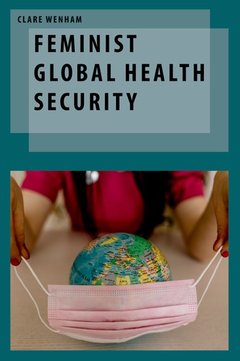Feminist Global Health Security Oxford Studies in Gender and International Relations Series
Langue : Anglais
Auteur : Wenham Clare

When Zika made headlines in 2016, images of women cradling babies affected with microcephaly spread across the media and pulled on heartstrings. But, as this book argues, whilst this outbreak was about women and babies, this outbreak also highlighted the lack of gendered considerations in global health security. The policy response to Zika focused on limiting the spread of the virus through domestic and civic cleaning to remove mosquitoes and by asking women to defer pregnancy. Both of these actions are inherently gendered, placing the burden of responsibility for stemming the spread of disease on women. By taking Zika as its primary case but also touching on COVID-19, Feminist Global Health Security asks what the policy response to disease outbreaks tell us about the role of women in global health security. More broadly, what would global health policy look like if it were to take gender seriously, and how would this impact global disease control? Beyond raising questions of gender equity, Clare Wenham also considers global health security's lack of consideration for sustainability in epidemic preparedness and response. Wenham argues that global health security in general has thus far lacked a substantive feminist engagement, with the result that the very policies created to manage an outbreak of disease disproportionately fail to protect women. We know that women have biological pre-disposition and social vulnerability to contracting a number of infectious diseases, making them more susceptible to infection. Yet, the dominant gender-blind policy narrative of global health security has created pathways which focus on protecting the international spread of disease and state economies, rather than protecting those who are most likely to be affected. As such, the state-based structure of global health security provides the fault line for global health security's failure to engage women. This book highlights the ways in which women are disadvantaged by global health security policy, through engagement with feminist international relations concepts of visibility, social and stratified reproduction, intersectionality, and structural violence. Wenham argues that it was no coincidence that poor, Black women living in low-quality housing were the most affected by the Zika outbreak and will continue to be so amid all epidemics, until meaningful engagement with gender is incorporated into global health security. As many news reports have made clear during COVID, there has been a recent sea change in thinking about the secondary effects of infectious disease control policy on women. However, we have yet to see this reflected in global health policy.
Clare Wenham is Assistant Professor of Global Health Policy at London School of Economics and Political Science (LSE). She specializes in global health security and the politics and policy of pandemic preparedness and outbreak response, through analysis of influenza, Ebola, Zika, and COVID-19. Her work has been featured in The Lancet, BMJ, Security Dialogue, International Affairs, BMJ Global Health and Third World Quarterly.
Date de parution : 09-2021
Ouvrage de 288 p.
16.6x24.4 cm
Disponible chez l'éditeur (délai d'approvisionnement : 21 jours).
Prix indicatif 72,62 €
Ajouter au panierThèmes de Feminist Global Health Security :
© 2024 LAVOISIER S.A.S.



